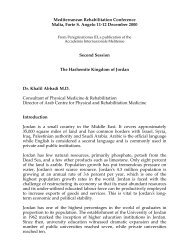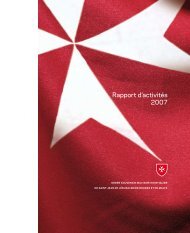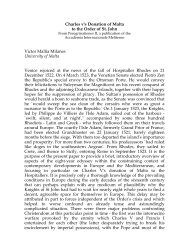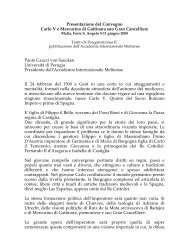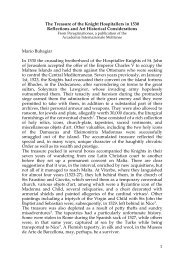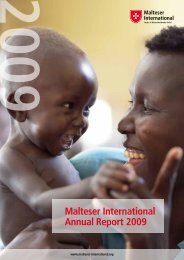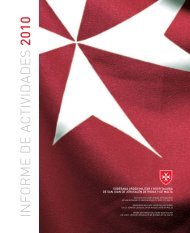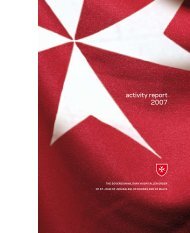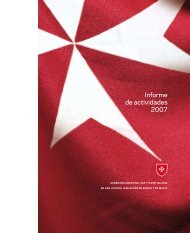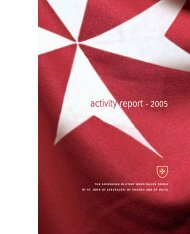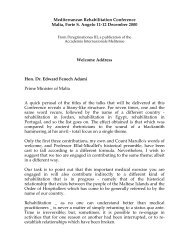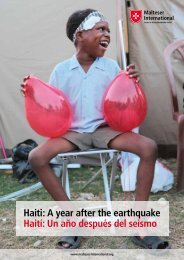Annual report 2005 Malteser International - Ordine di Malta
Annual report 2005 Malteser International - Ordine di Malta
Annual report 2005 Malteser International - Ordine di Malta
Create successful ePaper yourself
Turn your PDF publications into a flip-book with our unique Google optimized e-Paper software.
Africa<br />
Buil<strong>di</strong>ng up and strengthening health care structures, training local staff and combating epidemics<br />
are the main focus of attention for <strong>Malteser</strong> <strong>International</strong> in six countries in Eastern and South Africa.<br />
Close links between our projects are crucial, particularly in the me<strong>di</strong>cal sector. Measures to stem the<br />
HIV/AIDS pandemic as the world’s greatest <strong>di</strong>saster are combined with special programmes to combat<br />
illnesses such as tuberculosis, which arise particularly frequently in relation to HIV/AIDS. This means<br />
counteraction of these illnesses can be made even more effective. In order to fight the famine <strong>di</strong>saster in<br />
the Sahel, we extended our aid in summer <strong>2005</strong> to the west of the continent, provi<strong>di</strong>ng corn and maize<br />
for the people of Mali and Niger.<br />
Angola<br />
<strong>International</strong> staff: 3<br />
National staff: 19<br />
Aid for 100,000 people<br />
<strong>Malteser</strong> <strong>International</strong> has worked in<br />
Angola since 2002.<br />
Since the end of the 27-year civil war,<br />
<strong>Malteser</strong> <strong>International</strong> has been supplying<br />
acute emergency aid in the province of<br />
Kuando Kubango in the remote southwest<br />
of the country. Over the past few<br />
years, the number of aid organisations<br />
working in this inaccessible region –<br />
also known as ‘the end of the world’<br />
– has dropped sharply. Since <strong>2005</strong>, we<br />
have been one of the few organisations<br />
helping the suffering population deal with<br />
con<strong>di</strong>tions of extreme undersupply. In<br />
the transition phase from emergency aid<br />
to reconstruction, our focus was on the<br />
development of and support for existing<br />
local resources in the health care sector.<br />
Unfortunately, large areas of our project<br />
region were closed in <strong>2005</strong> due to the<br />
fin<strong>di</strong>ng of more mines. This meant we<br />
could only work within a limited area. We<br />
regularly provided me<strong>di</strong>cine and me<strong>di</strong>cal<br />
supplies that were urgently needed for 15<br />
isolated health care facilities in the <strong>di</strong>strict<br />
of Menongue. In a one-off campaign, we<br />
<strong>di</strong>stributed me<strong>di</strong>cal supplies and around<br />
90,000 tablets for malaria treatment. We<br />
supported local self-help organisations as<br />
they explained to the people about HIV/<br />
AIDS and looked after those affected by<br />
the <strong>di</strong>sease. As part of the World AIDS<br />
Day, we took part in a ten-day sensitisation<br />
campaign at police stations and barracks,<br />
reaching around 800 people in the process.<br />
In the accessible regions of the province<br />
of Kuando Kubango, we supported the<br />
national polio immunisation campaign,<br />
during which over 100,000 children<br />
received vital vaccine protection.<br />
Angola: Children in Kuando Kubango are particularly<br />
affected by malnutrition and insufficient me<strong>di</strong>cal<br />
supplies.<br />
Up till now, our relief programmes<br />
have mainly been financed from private<br />
donations. For the year 2006, we are<br />
preparing an extensive programme to<br />
reconstruct remote health care facilities<br />
and to combat HIV/AIDS, tuberculosis<br />
and malaria, with financial support<br />
from the European Union and other<br />
international donors.<br />
Democratic Republic of Congo<br />
<strong>International</strong> staff: 10<br />
National staff: 126<br />
Aid for 2.7 million people<br />
<strong>Malteser</strong> <strong>International</strong> has worked<br />
in the Democratic Republic of Congo<br />
since 1996.<br />
For the Democratic Republic (DR)<br />
of Congo, peaceful relations across the<br />
country are still a long way off. Unrest<br />
and insecurity remain prevalent, mainly<br />
in the east of the country, but at increasing<br />
levels in the south as well. Numerous<br />
pacification efforts by the United Nations<br />
and the European Union have only<br />
achieved selective relief. It has at least<br />
been possible to dramatically restrict the<br />
tyranny of the self-proclaimed warlords.<br />
Thus, it has been possible for aid<br />
organisations to carry out aid measures<br />
for the population relatively un<strong>di</strong>sturbed.<br />
<strong>Malteser</strong> <strong>International</strong> has continued<br />
its long-running support in the region,<br />
now reaching a period of over ten years.<br />
In order to promote long-term structures<br />
for self-sufficient supply, our work<br />
Angola: Provision of<br />
urgently needed me<strong>di</strong>cine for<br />
health care centres in remote<br />
areas.<br />
A F R I C A<br />
9



